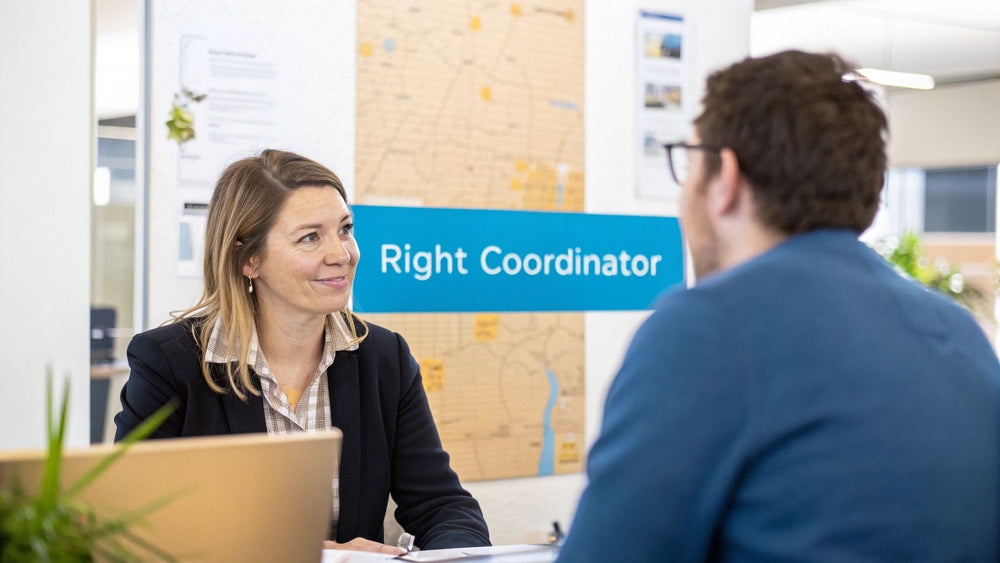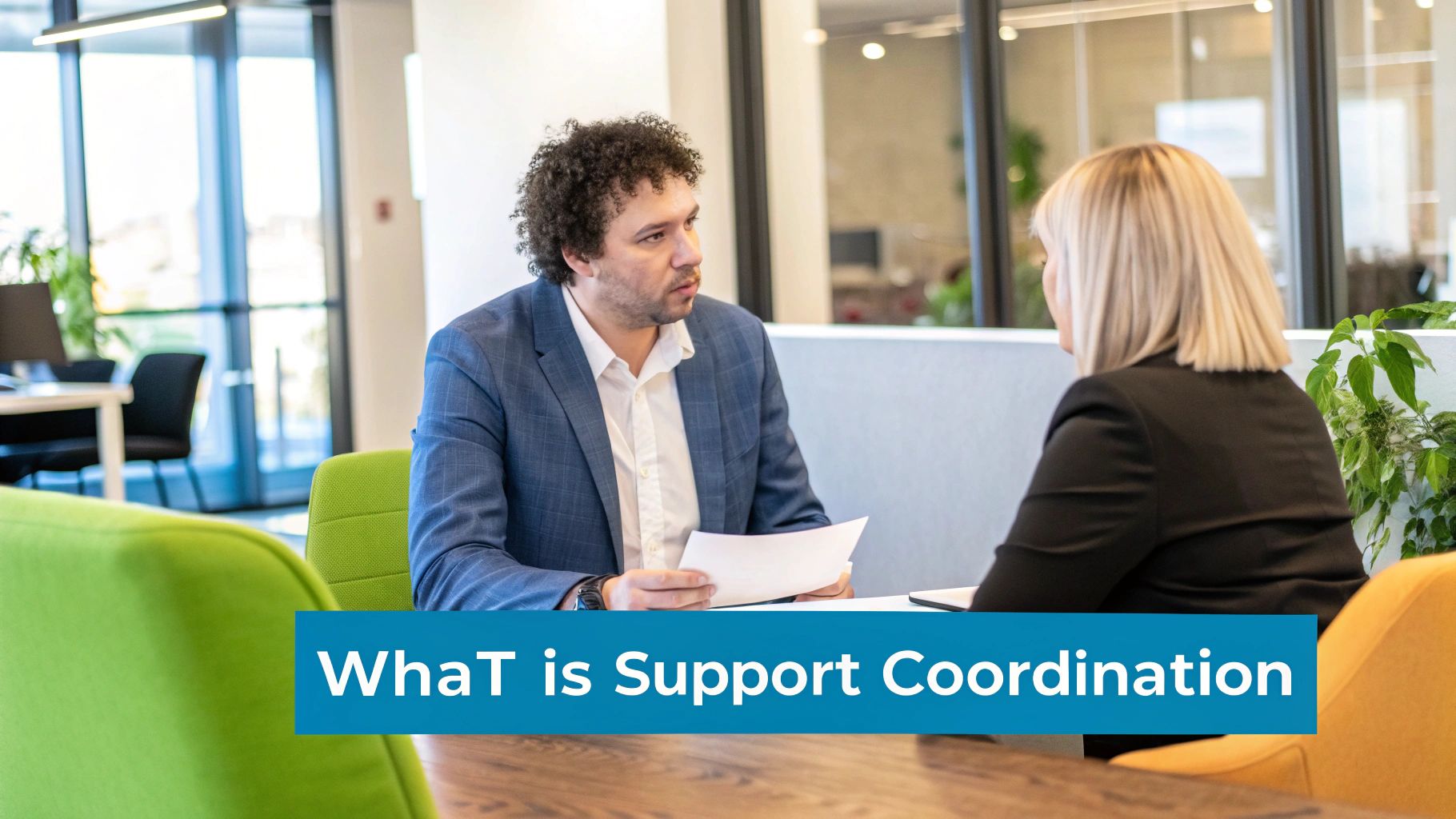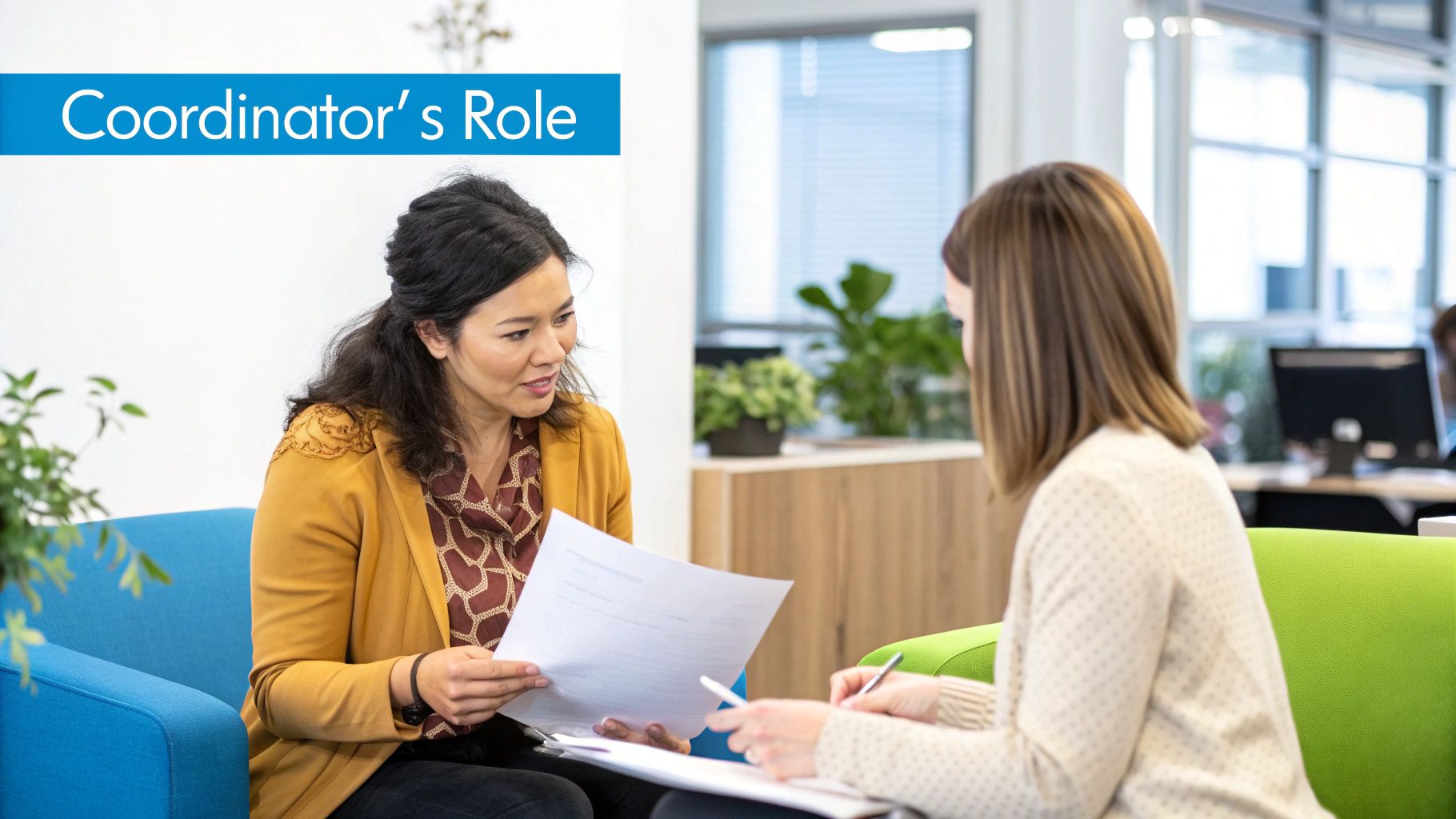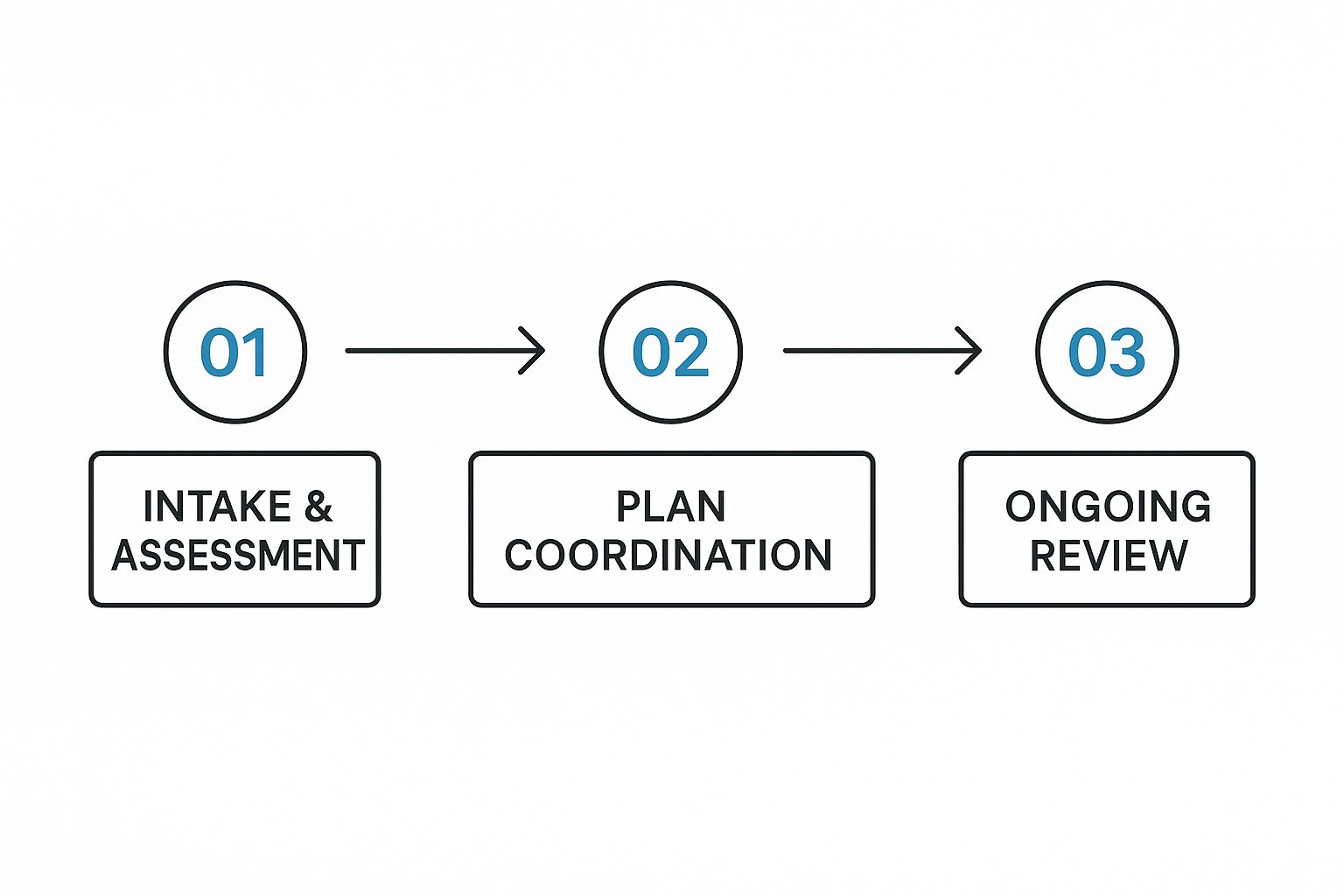Find the Right Support Coordinator Adelaide

Finding the right support coordinator in Adelaide isn't just about ticking a box on your NDIS plan. It's about finding a genuine partner who can make your entire journey smoother and more successful. The best local coordinators are advocates who know Adelaide’s services inside and out, connecting you with the right people and places to truly thrive.
Why a Local Adelaide Coordinator Is a Game Changer

Let's be honest: navigating the NDIS can feel like learning a new language. A great local support coordinator is your interpreter and strategist, someone whose entire job is to make your plan work for you, not the other way around. They do far more than just manage budgets; they build a whole network of support that fits into your life.
The real magic is in their local knowledge. An Adelaide-based coordinator has a feel for the city's pulse and understands the local service landscape on a deep level. They’ll know which therapy services in the southern suburbs have shorter waitlists, which community groups in the west align with your interests, and exactly who to call to sort out a problem fast. This kind of insider knowledge is what turns your NDIS funding into real, positive changes in your life.
You can find more insight on why this is so important from other experts in Adelaide's disability sector.
A great local coordinator isn't just a service provider; they are a community connector. Their role is to bridge the gap between the words on your NDIS plan and the real-world opportunities waiting for you across Adelaide.
Uncovering Hidden Opportunities
A top-tier support coordinator in Adelaide doesn’t just stick to the big, well-known providers. They have personal connections and have done the groundwork to find smaller, specialised services that you'd likely never find in a standard search.
What does that look like in practice? They might know about:
- A brand-new art therapy group in Norwood that's perfect for someone wanting to explore their creative side.
- A quiet, sensory-friendly gym in Marion with trainers who are genuinely experienced in disability support.
- A community garden project popping up in the northern suburbs that’s fantastic for social connection and learning new skills.
These aren't just random suggestions. They are thoughtful, personalised connections designed to help you live a richer life and smash your personal goals. This is precisely what separates an okay coordinator from an exceptional one. They tap into Adelaide’s unique resources to build a support system that helps you flourish, not just get by.
Here's a breakdown of what to look for when you're meeting potential coordinators.
Essential Traits of a Top-Tier Adelaide Coordinator
This table breaks down the key qualities you should look for in a support coordinator to ensure they are the right fit for your needs in the Adelaide area.
| Essential Quality | Why It Matters in Adelaide | Red Flags to Watch For |
|---|---|---|
| Deep Local Networks | Knows the best OTs in Prospect, the most accessible cafes in Glenelg, and the community transport options in Tea Tree Gully. | Only suggests large, city-wide providers. Vague answers about local services. |
| Proactive & Creative | Doesn't just wait for you to ask. Suggests new ideas, finds new groups, and thinks outside the box to meet your goals. | Passive communication. Only acts when you chase them. Lacks enthusiasm or ideas. |
| Person-Centred Focus | Genuinely listens to your goals and preferences, not what they think is best. Your plan meetings feel like a true collaboration. | Talks more than they listen. Pushes their own preferred providers. Doesn't remember your personal goals. |
| Excellent Communicator | Keeps you in the loop, explains NDIS jargon clearly, and responds to emails or calls within a reasonable time. | You have to chase them for updates. Their explanations are confusing. They go quiet for long periods. |
Ultimately, finding a coordinator with these traits means you'll have an advocate who is truly in your corner, ready to make the most of what Adelaide has to offer.
Where to Find Your Ideal Coordinator

So, where do you actually begin looking for the best support coordinator Adelaide has to offer? A quick Google search is a start, but from my experience, the truly great connections come from a mix of official tools and trusted community wisdom.
The NDIS Provider Finder portal is your official starting line. It's an essential tool because it lets you filter specifically for "Support Coordination" in Adelaide. This immediately narrows your search to registered providers who are verified and meet the NDIS Commission's quality and safety standards.
But don't stop there. Some of the best leads come from the people who are already part of your support network. Think about your GP, occupational therapist, or other allied health professionals. They interact with support coordinators all the time and have a unique, behind-the-scenes perspective on who is responsive, reliable, and genuinely good at their job.
A recommendation from a trusted allied health professional is incredibly valuable. They see which coordinators communicate effectively, follow through on promises, and genuinely collaborate to achieve the best outcomes for participants.
Tapping Into Community Wisdom
Another goldmine of information is the local disability community here in Adelaide. There are plenty of active Facebook groups and online forums where NDIS participants and their families share their real-world experiences.
Jumping into one of these groups and asking a simple question like, "Can anyone recommend a great support coordinator who works in the southern suburbs?" can bring you honest feedback you just won't find on a company website. This is where you learn about a coordinator's communication style and problem-solving skills directly from people who have worked with them.
For a bit more detail on what to look for in a great partnership, have a read of our Vana Care guide on choosing the right disability support in Adelaide.
As you build your list, you'll notice a couple of different provider types, each with its own pros and cons:
- Independent Coordinators: These are often sole traders. The big advantage is a highly personalised service with one consistent point of contact. You build a strong relationship directly with them.
- Larger Agencies: These organisations have a team of coordinators. This means there’s usually backup support if your main contact is sick or on leave, but you might not get that same one-on-one connection.
There’s no single "best" way to find someone. The most effective approach is always to combine the official NDIS search tools with personal, real-world recommendations. This gives you a solid, well-rounded list of potential partners to start your NDIS journey with.
Interviewing Coordinators to Find the Perfect Match
Alright, you've done the research and have a shortlist of potential support coordinators. Now comes the most important part: the initial chat. This is your moment to see if they're a good fit, not just on paper, but in person. Think of it less like a formal job interview and more like a conversation to see if you click.
You need to get past the generic sales pitch. Instead of asking a vague question like, "Do you have experience?", get specific. Try something like, "Could you walk me through a time you helped someone with goals similar to mine?" This pushes them to share real stories, not just give you a simple 'yes'.
Another great question to have up your sleeve is, "How do you handle a situation where a service provider isn't delivering what was promised?" Their answer tells you everything about their ability to advocate and whether they’ll truly go to bat for you when things get tough. You can get a better sense of what a strong partnership with a dedicated disability support coordinator really involves by exploring what that relationship should look like.
Gauging Their Availability and How They Work
This is a big one. You have to ask about their current capacity. The NDIS landscape in Adelaide has been under immense pressure lately. An estimated 45% of NDIS-registered support coordination providers in South Australia have actually stopped offering these services, which has put a massive strain on the ones who are left.
This industry reality makes it absolutely vital to ask about their caseload. Don't be shy. Some of the best coordinators I've seen intentionally keep their client list to around 20 participants so they can provide top-notch, personalised service. On the flip side, some are juggling caseloads of 50 or more.
A support coordinator who is stretched too thin simply can't give you the proactive, thoughtful support you need and deserve. Asking about their current caseload isn't being difficult; it's being smart.
This infographic lays out the typical day-to-day work of a support coordinator.

As you can see, there are a lot of moving parts, from assessments to managing services. It really drives home why a manageable number of clients is so critical for them to do their job well for every single person they support.
To get a real feel for what it would be like to work with them, try asking a few practical questions:
- Staying in Touch: "What's the best way to get in touch with you, and how quickly do you usually get back to emails or phone calls?"
- Thinking Outside the Box: "Can you tell me about a time you had to get creative to find a solution for a participant when the usual options weren't working?"
- Preparing for Reviews: "How do you work with your participants to get ready for their NDIS plan review meetings?"
The way they answer these questions will paint a very clear picture of what you can expect from them on a day-to-day basis. It helps you see beyond the brochure and understand how they'll really show up for you.
Getting to Grips with Service Agreements and Your NDIS Funding

Let's talk money and paperwork. Getting your head around the financial side of your NDIS plan is one of the best ways to build your confidence and make sure there are no nasty surprises down the track.
Your support coordination is almost always funded under the Capacity Building budget in your NDIS plan. The first thing to do is check this section to see exactly how many hours have been allocated for this specific service.
A great support coordinator in Adelaide will kick things off by sitting down with you to go over your plan. They should clearly explain how they intend to use those allocated hours to help you hit your goals. This first chat really sets the tone for a transparent and honest partnership, making sure you're both on the same page about what's achievable with your budget.
What to Look for in a Service Agreement
Before you officially sign on with a support coordinator, they'll give you a service agreement. Don't just skim it! This document is the roadmap for how you'll work together, so it pays to read it carefully.
I always tell people to pay close attention to a few specific areas. Look for clear details on things like:
- Staying in Touch: How often will they check in? What’s their typical turnaround time for returning calls or emails?
- Plan Review Prep: What’s the game plan for getting ready for your NDIS plan reviews?
- Handling Issues: If you have a problem or disagree on something, what are the steps to resolve it?
- Ending the Agreement: How much notice does either you or the provider need to give to part ways?
A clear, well-written service agreement is a massive green flag. It tells you you're dealing with a professional who values clarity. It protects everyone involved by setting expectations right from the start.
This agreement is a cornerstone of your NDIS journey. By understanding it, you can get a better handle on maximising your NDIS plan and the essential role of support coordination.
It also helps to understand the professional value your coordinator brings. For some context, the average salary for a Support Coordinator in Adelaide hovers around AUD 76,129 per year, which reflects just how complex and critical the role is. Knowing this helps you see the professional service you're engaging. A fair agreement empowers you to build a strong, effective partnership from day one.
Fostering a Powerful Partnership with Your Coordinator
Finding a brilliant support coordinator in Adelaide is a huge win, but it's really just the beginning. The real magic happens when you build a genuine, collaborative partnership. This relationship is what will truly power your NDIS plan, taking your goals from a piece of paper and turning them into real-life achievements.
The bedrock of any strong partnership is, without a doubt, open communication. Right from your first chat, it’s a great idea to set the ground rules for how you’ll work together. Do you prefer a quick weekly phone call to touch base? Or is email better for day-to-day questions? Figuring this out early on saves a lot of potential headaches and makes sure you both feel in the loop.
This open line of communication becomes absolutely vital when things don't quite go to plan. Say you start with a new provider and the vibe just isn't right—you need to feel comfortable enough to say so, straight away. A solid partnership means you can have those frank conversations without any fear or awkwardness.
Gearing Up for Success, Together
One of the most valuable roles your coordinator plays is getting you ready for your NDIS plan reviews. A proactive coordinator doesn't just turn up on the day. They'll be in touch weeks beforehand, helping you pull together all the necessary reports and evidence.
This forward-thinking approach can completely change the outcome. Your coordinator will be your ally, helping you to:
- Round Up Reports: They can chase down progress reports from your therapists and other providers, creating a clear picture of how your funding is helping.
- Map Out Your Future: You'll talk through what’s worked well over the last year, what hasn’t, and what you’re aiming for in the next 12 months.
- Clearly State Your Case: They help you find the right words to explain why specific supports are essential for your independence and wellbeing.
A great plan review outcome is a team effort. When you and your coordinator are on the same page and have built a strong case together, you stand a much better chance of securing the funding needed to chase your dreams.
This kind of collaborative spirit is at the heart of what we see as true community empowerment through disability support. It’s about you being in the driver's seat, not just a passenger.
When your life changes or your goals shift, your coordinator should be the first person you call. Together, you can adapt your plan and keep moving forward. It’s this responsive, dynamic partnership that unlocks the full potential of your NDIS journey.
Your Questions About Support Coordination Answered
When you're navigating the NDIS, it’s only natural for questions to pop up. Let's tackle some of the most common ones we hear from NDIS participants here in Adelaide about finding and working with a support coordinator.
What Does a Support Coordinator Actually Do?
Think of a support coordinator as your NDIS co-pilot. Their core role is to help you make sense of your plan, find the best local services to help you reach your goals, and make sure every dollar of your funding is working for you. They take on the tricky bits—like talking to providers and getting everything ready for your plan reviews—so you can concentrate on what’s truly important.
But a great support coordinator in Adelaide does more than just tick boxes. They should also be focused on helping you build your own confidence and skills. The goal isn't for them to manage your plan forever; it's to empower you to feel more in control of your own NDIS journey over time.
How Is Support Coordination Funded in My NDIS Plan?
Funding for support coordination comes from your Capacity Building budget. When you get your plan, you'll want to check that category to see exactly how many hours have been set aside for this type of support. If you don't have it but feel you need it, make sure to bring it up at your next plan review.
Your coordinator should sit down with you and map out a budget based on those allocated hours. This ensures their time is used wisely throughout your plan, hitting the goals you’ve set together.
A common worry I hear is, "What if my support coordination funding runs out before my plan ends?" A good coordinator tackles this head-on. They should be upfront about how they'll manage your hours to provide support all year long, making sure enough time is saved to properly prepare for your next plan review.
Can I Change My Support Coordinator If It’s Not a Good Fit?
Yes, absolutely. Choice and control are at the heart of the NDIS, and that includes who you choose to have on your team. If your current coordinator isn't the right match—maybe the communication is off, they don't seem to know the Adelaide area well, or you just don't feel heard—you have every right to find someone who is.
Typically, your service agreement will outline a notice period, which is usually around two to four weeks. This gives everyone enough time for a smooth handover to your new provider without causing any interruptions to your other supports. For a deeper dive, check out our complete guide on navigating the NDIS in Adelaide.
At Vana Care, we see support coordination as a genuine partnership. Our Adelaide team is passionate about getting to know you and your goals, connecting you with the community in a way that feels right for you. Start the conversation with us today and let's explore how we can help you build confidence and independence on your NDIS journey.


